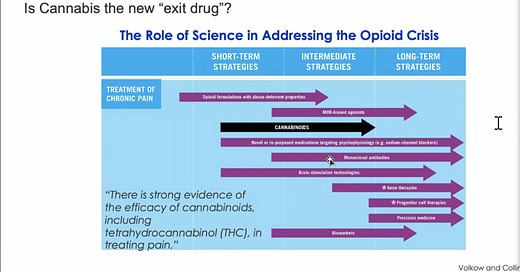America's Exit Drugs
Cannabis's potential utility in the fight against overdoses and opioid addiction
There is powerful evidence that cannabis and/or psychedelics could help turn the tide in our nation’s existential struggle against opioid use disorder and the related overdose epidemic that is killing Americans by the hundreds of thousands each year. Don’t believe me? Fair enough. Perhaps you’ll believe NIDA Director, Dr. Nora Volkow, and former NIH Director and recently named “Science Advisor to the President,” Dr. Francis S. Collins.
In a 2017 article published in one of the most prestigious peer-reviewed medical journals on the planet, they recognized that “[t]here is strong evidence of the efficacy of cannabinoids, including tetrahydrocannabinol (THC), in treating pain” and concluded that “[m]edications that target the endocannabinoid system … could provide a powerful new tool” for “chronic pain management.” And studies, including clinical trials, investigating the use of psychedelics for opioid use disorder are already underway.
Yet the Wall Street Journal recently quoted one lawmaker who opposes cannabis reform because, in his words, “[w]e have enough problems with gateway drugs the way that it is right now.” While he’s unquestionably right that America has a problem with gateway drugs, it seems he is laboring under the long-ago-discredited view that cannabis is a gateway drug. In fact, no one takes the “gateway drug” hypothesis seriously anymore, including HHS and DEA, which formally and officially abandoned the hypothesis in 2016.1
As Drs. Collins and Volkow recognized in 2017, America’s gateway drugs are pharmaceutical opioids. With millions of Americans struggling with opioid use disorder and thousands overdosing on fentanyl every year, that much should be obvious to anyone paying attention. Their more significant insight, however, is that there is powerful evidence that cannabis and (I would submit) psychedelics can be America’s “exit drugs.”
Put simply, the seriousness of America’s overdose and addiction epidemic makes the need for cannabis and psychedelics reform more—not less—urgent.
81 Fed. Reg. 53767, 53784 (Aug. 12, 2016) (concluding that “research does not support a direct causal relationship between regular marijuana use and other illicit drug use” and emphasizing that “[l]ittle evidence supports the hypothesis that initiation of marijuana use leads to an abuse disorder with other illicit substances”). Full text of the decision available at https://www.govinfo.gov/content/pkg/FR-2016-08-12/pdf/2016-17960.pdf.




